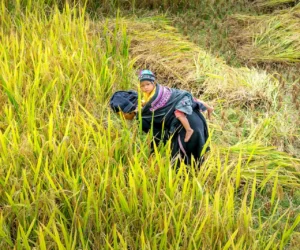
After decades of supplying ingredients for Colman’s products, some mint and mustard farms in the UK are embarking on a new venture: safeguarding Unilever’s mustard supply chain and future-proofing their yields through the adoption of regenerative agriculture practices. Unilever and Colman’s are initiating their inaugural regenerative agriculture project in the UK, with the primary goal of ensuring food security and bolstering the resilience of the business’s raw material supply chains.
At the heart of this project lies a commitment to bolstering soil health in the UK, where soil degradation poses a significant threat. Globally, an area equivalent to one soccer pitch of soil is lost every five seconds, highlighting the urgent need for intervention. Funded by Unilever’s Climate & Nature Fund, this project forms part of a broader global initiative aimed at protecting and regenerating 1.5 million hectares of land, forests, and oceans by 2030.
Soil stands as the most vital asset for mint and mustard growers in the UK. The health of their yields, revenues, and interconnected supply chains hinges upon it. However, this invaluable asset faces imminent peril. With soil erosion occurring at an alarming rate globally, compounded by increasingly volatile weather patterns, UK farmers supplying Colman’s products are investing in the longevity of their soil and environment. This investment is made possible through both financial and technical support from Unilever.
James Holmes, Unilever’s Plant Science & Technology Lead, underscores the criticality of soil health and environmental well-being for both Unilever and farmers. He emphasizes that adapting to climate change is imperative for farmers to sustain their agricultural practices. Regenerative agriculture emerges as the most promising approach to confront these challenges, prompting Unilever to collaborate with mint and mustard farms in Norwich and Peterborough to trial various regenerative practices.
The trials will gather data on key indicators such as soil health, fertilizer usage, and farm profitability. These trials will introduce innovative practices including cover and companion crops, alternative pest control methods, digital irrigation scheduling systems, and reduced cultivation. The aim is to address specific challenges faced by mint and mustard farmers, such as crop devastation by beetles and dependence on imported fertilizers.
Unilever’s technical partner, the National Institute of Agricultural Botany (NIAB), brings unique expertise to the project. Working closely with farmers, NIAB has established baseline data and a framework for measuring the impact of regenerative practices. Farmers like Greg Bliss are enthusiastic about the prospect of using metrics to gauge improvements and make necessary adjustments.
The initial harvest of crops cultivated using regenerative agriculture practices is slated for July. Data collected will undergo rigorous auditing as part of Unilever’s global Measurement Reporting and Verification System, with results expected to be published in 2025.
Andre Burger, Unilever’s UK and Ireland Head of Nutrition, stresses the importance of prioritizing soil health for all food businesses. In the face of the escalating climate crisis, he underscores the imperative not only to protect but also to regenerate soil and farmland essential for food production.




